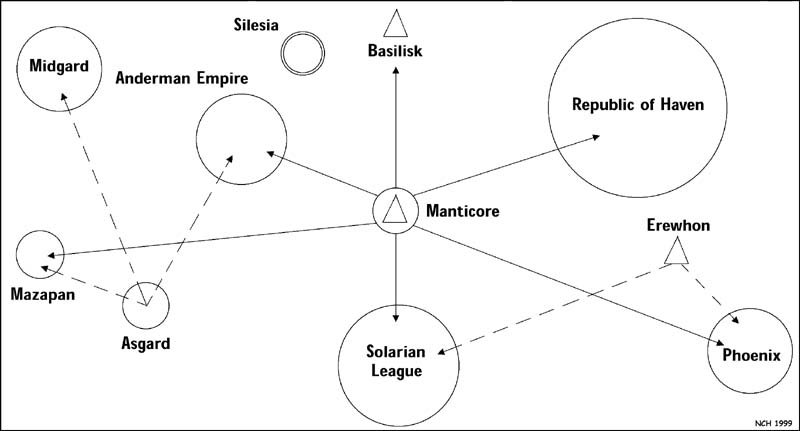ON BASILISK STATION
by David Weber
This is a work of fiction. All the characters and events portrayed in this book are fictional, and any resemblance to real people or incidents is purely coincidental.
Copyright 1993 by David M. Weber
All rights reserved, including the right to reproduce this book or portions thereof in any form.
A Baen Books Original
Baen Publishing Enterprises
P.O. Box 1403
Riverdale, NY 10471
ISBN: 0-7434-3571-0
Cover art by David Mattingly
First hardcover printing, March 1999
Distributed by Simon & Schuster
1230 Avenue of the Americas
New York, NY 10020
Library of Congress Cataloging-in-Publication Data
Weber, David 1952
On Basilisk Station / David Weber.
p. cm.
ISBN 0-7434-3571-0
I. Title II. Title: Honor Harrington on Basilisk Station.
PS3573.E21705 1999 98-32222
813'.54dc21 CIP
Production by Windhaven Press, Auburn, NH
Printed in the United States of America
PROLOGUE
To C. S. Forester,
With thanks for hours of enjoyment,
years of inspiration,
and a lifetime of admiration.

The ticking of the conference room's antique clock was deafening as the Hereditary President of the People's Republic of Haven stared at his military cabinet. The Secretary of the Economy looked away uncomfortably, but the Secretary of War and her uniformed subordinates were almost defiant.
"Are you serious?" President Harris demanded.
"I'm afraid so," Secretary Frankel said unhappily. He shuffled through his memo chips and made himself meet the president's eyes. "The last three quarters all confirm the projection, Sid." He glowered sideways at his military colleague. "It's the naval budget. We can't keep adding ships this way without"
"If we don't keep adding them," Elaine Dumarest broke in sharply, "the wheels come off. We're riding a neotiger, Mr. President. At least a third of the occupied planets still have crackpot 'liberation' groups, and even if they didn't, everyone on our borders is arming to the teeth. It's only a matter of time until one of them jumps us."
"I think you're overreacting, Elaine," Ronald Bergren put in. The Secretary for Foreign Affairs rubbed his pencil-thin mustache and frowned at her. "Certainly they're armingI would be, too, in their placebut none of them are strong enough to take us on."
"Perhaps not just now," Admiral Parnell said bleakly, "but if we get tied down elsewhere or any large-scale revolt breaks out, some of them are going to be tempted into trying a smash and grab. That's why we need more ships. And, with all due respect to Mr. Frankel," the CNO added, not sounding particularly respectful, "it isn't the Fleet budget that's breaking the bank. It's the increases in the Basic Living Stipend. We've got to tell the Dolists that any trough has a bottom and get them to stop swilling long enough to get our feet back under us. If we could just get those useless drones off our backs, even for a few years"
"Oh, that's a wonderful idea!" Frankel snarled. "Those BLS increases are all that's keeping the mob in check! They supported the wars to support their standard of living, and if we don't"
"That's enough!" President Harris slammed his hand down on the table and glared at them all in the shocked silence. He let the stillness linger a moment, then leaned back and sighed. "We're not going to achieve anything by calling names and pointing fingers," he said more mildly. "Let's face itthe DuQuesene Plan hasn't proved the answer we thought it would."
"I have to disagree, Mr. President," Dumarest said. "The basic plan remains sound, and it's not as if we have any other choice now. We simply failed to make sufficient allowance for the expenses involved."
"And for the revenues it would generate," Frankel added in a gloomy tone. "There's a limit to how hard we can squeeze the planetary economies, but without more income, we can't maintain our BLS expenditures and produce a military powerful enough to hold what we've got."
"How much time do we have?" Harris asked.
"I can't say for certain. I can paper over the cracks for a while, maybe even maintain a facade of affluence, by robbing Peter to pay Paul. But unless the spending curves change radically or we secure a major new source of revenue, we're living on borrowed time, and it's only going to get worse." He smiled without humor. "It's a pity most of the systems we've acquired weren't in much better economic shape than we were."
"And you're certain we can't reduce Fleet expenditures, Elaine?"
"Not without running very grave risks, Mr. President. Admiral Parnell is perfectly correct about how our neighbors will react if we waver." It was her turn to smile grimly. "I suppose we've taught them too well."
"Maybe we have," Parnell said, "but there's an answer to that." Eyes turned to him, and he shrugged. "Knock them off now. If we take out the remaining military powers on our frontiers, we can probably cut back to something more like a peace-keeping posture of our own."
"Jesus, Admiral!" Bergren snorted. "First you tell us we can't hold what we've got without spending ourselves into exhaustion, and now you want to kick off a whole new series of wars? Talk about the mysteries of the military mind!"
"Hold on a minute, Ron," Harris murmured. He cocked his head at the admiral. "Could you pull it off, Amos?"
"I believe so," Parnell replied more cautiously. "The problem would be timing." He touched a button and a holo map glowed to life above the table. The swollen sphere of the People's Republic crowded its northeastern quadrant, and he gestured at a rash of amber and red star systems to the south and west. "There are no multi-system powers closer than the Anderman Empire," he pointed out. "Most of the single-system governments are strictly small change; we could blow out any one of them with a single task force, despite their armament programs. What makes them dangerous is the probability that they'll get organized as a unit if we give them time."
Harris nodded thoughtfully, but reached out and touched one of the beads of light that glowed a dangerous blood-red. "And Manticore?" he asked.
"That's the joker in the deck," Parnell agreed. "They're big enough to give us a fight, assuming they've got the guts for it."
"So why not avoid them, or at least leave them for last?" Bergren asked. "Their domestic parties are badly divided over what to do about uscouldn't we chop up the other small fry first?"
"We'd be in worse shape if we did," Frankel objected. He touched a button of his own, and two-thirds of the amber lights on Parnell's map turned a sickly gray-green. "Each of those systems is almost as far in the hole economically as we are," he pointed out. "They'll actually cost us money to take over, and the others are barely break-even propositions. The systems we really need are further south, down towards the Erewhon Junction, or over in the Silesian Confederacy to the west."
"Then why not grab them straight off?" Harris asked.
"Because Erewhon has virtual League membership, Mr. President," Dumarest replied, "and going south might convince the League we're threatening its territory. That could be, ah, a bad idea." Heads nodded around the table. The Solarian League had the wealthiest, most powerful economy in the known galaxy, but its foreign and military policies were the product of so many compromises that they virtually did not exist, and no one in this room wanted to irritate the sleeping giant into evolving ones that did.















